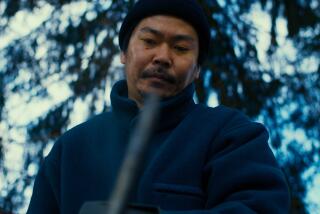MOVIE REVIEW : ‘Hachi-Ko’: Tale of Devotion to Rend the Heart
The Japanese movie “Hachi-Ko” (at the Little Tokyo Cinema) shows us an example of love and fidelity so extreme that it seems, in our modern context, anachronistic. But this meticulously fashioned tale of devotion between dog and master evades most of the pitfalls of sentimentality; it even survives the gaucherie of cherry blossom fantasies and a saccharine disco song pasted over its witheringly poignant last shot. It becomes a movie to break your heart.
In the film, a handsome white Akita dog named Hachi refuses to accept the death of its master, gentle Professor Ueno (Tatsuya Nakadai), from a heart attack in 1925. The animal, shunted off or ignored by the professor’s uncaring relatives, then abandoned to the streets, finally dies 10 years later, at the Shibuya railroad station--where, during Ueno’s life, it came every day to greet him as he returned from work. For an entire decade--as the stray dog’s life steadily deteriorates into hunger, cold and misery--it keeps returning to the station, patiently “waiting” for the man it loved, the man it knows has died and will never return.
It’s a true story, and the film has a feeling of truth. Little details--like the gradual deterioration and loss of Hachi’s splendid black leather harness--resonate each time you see them. The dog becomes a pure symbol of devotion in a highly imperfect world, one that director Seijiro Koyama and writer Kaneto Shindo consistently indict for cruelty and lack of compassion.
The unkindest cuts here come from Ueno’s relatives--some of whom, like his wife Shizuko (Kaoru Yachigusa), seem jealous of Hachi; some of whom are simply callous and thoughtless, such as an uncle who keeps him chained in the rain. The worst culprits--Ueno’s daughter, Chizuko (Mako Ishino), and her meanly smiling, ferrety-faced husband--are self-absorbed climbers, yuppies before their time. They refuse to keep Hachi because they don’t want to be reminded of “unpleasant things” like death. They force the sale of the family home--to which Hachi keeps returning--to a dog-hating buffoon who dismantles it. They are the ravagers of memory, as Hachi is its heroic custodian.
Koyama’s direction is sensitive, the cast excellent--especially Kaoru Yachigusa, the always superb Nakadai, and the remarkable set of dogs who play Hachi. The writer, 75-year-old Kaneto Shindo--one of the key Japanese scenarists, both for himself (“The Island”) and others--is sometimes accused of bathos. But his script here is a masterpiece of construction and compression. Shindo usually mixes social concerns with sentiment. Here he delicately balances the two; generously sketching in the paradise of Hachi’s first two years, then painting his exile with unnervingly swift transitions.
The movie’s ceaseless ironies--callous Chizuko is at first Hachi’s greatest partisan--begin to stab at you. We keep rushing with heart-rending inevitability toward that poignant finale, waiting in frustration for the modicum of kindness that could have prevented it. Finally, the tenaciously held love of this faithful animal becomes its own reward: a richer one, sadly, than most of the humans around it can realize. ‘HACHI-KO’
A Shochiku Co. Ltd. distribution of a Tokyu Group/Mitsui Co/Shochiku production. Producers Hisao Nabeshima, Junichi Shindo. Director Seijiro Koyama. Script Kaneto Shindo. Camera Masahisa Himeda. Music Tetsuki Hayashi. With Tatsuya Nakadai, Kaoru Yachigusa, Mako Ishino, Hiroyuki Nagato.
Running time: 1 hour, 48 minutes.
Times-rated: Family.
More to Read
Only good movies
Get the Indie Focus newsletter, Mark Olsen's weekly guide to the world of cinema.
You may occasionally receive promotional content from the Los Angeles Times.










